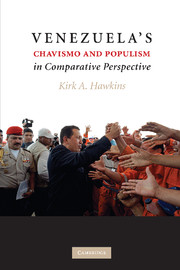Book contents
- Frontmatter
- Contents
- List of Tables
- Preface
- Acknowledgments
- 1 Introduction
- 2 Chavismo, Populism, and Democracy
- 3 Measuring the Populist Discourse of Chavismo
- 4 Party System Breakdown and the Rise of Chavismo
- 5 The Causes of Populism in Comparative Perspective
- 6 Populist Organization: The Bolivarian Circles in Venezuela
- 7 Populist Policy: The Missions of the Chávez Government
- 8 Conclusion
- Appendix A The Populist Speech Rubric
- Appendix B Test of the Sampling Technique
- Appendix C Test of Interaction Effects
- References
- Index
5 - The Causes of Populism in Comparative Perspective
Published online by Cambridge University Press: 17 May 2010
- Frontmatter
- Contents
- List of Tables
- Preface
- Acknowledgments
- 1 Introduction
- 2 Chavismo, Populism, and Democracy
- 3 Measuring the Populist Discourse of Chavismo
- 4 Party System Breakdown and the Rise of Chavismo
- 5 The Causes of Populism in Comparative Perspective
- 6 Populist Organization: The Bolivarian Circles in Venezuela
- 7 Populist Policy: The Missions of the Chávez Government
- 8 Conclusion
- Appendix A The Populist Speech Rubric
- Appendix B Test of the Sampling Technique
- Appendix C Test of Interaction Effects
- References
- Index
Summary
Let us teach government to those who robbed our country.
Evo Morales, campaign speech in 2005Enough with these spoilers of the fatherland! A fight to the death against corruption!
Rafael Correa, campaign speech in 2006In this chapter I move beyond the case of Chavismo in Venezuela to consider the causes of populism in the aggregate, across multiple countries and regions. This comparative perspective reveals causal mechanisms that a single-country case study or an individual-level analysis within that country cannot. While individual-level analysis may be needed to avoid the ecological fallacy (inferring individual-level attributes from aggregate outcomes; see Robinson 1950), and while case studies allow us to explore causal mechanisms and temporal sequencing (Brady and Collier 2004; D. Hawkins 2009), aggregate, multicountry analyses help us discern omitted variables and say something more generalizable (King, Keohane, and Verba 1994, 30). An aggregate-level analysis is especially appropriate when making causal claims that connect institutions or systemic phenomena, such as the rule of law, economic performance, and populist movements, all of which are more than the sum of individual attitudes and behaviors.
The analysis in this chapter is necessarily limited; given our dataset on populist discourse, we can only examine a narrow snapshot of recent history for a modest number of countries. This creates a challenge for us as we try to measure a relatively volatile phenomenon like populist movements. Yet, the panel data here give us some empirical leverage by allowing us to better identify necessary and facilitating conditions, which should be present in whatever cases of populism are found in the dataset.
- Type
- Chapter
- Information
- Venezuela's Chavismo and Populism in Comparative Perspective , pp. 131 - 165Publisher: Cambridge University PressPrint publication year: 2010

